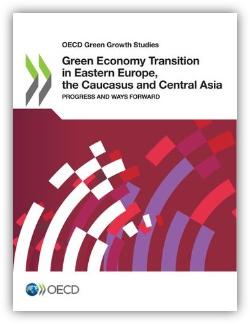Environment in emerging and transition economies
GREEN Action Task Force: Mission, substantive focus, working methods and members
Mission | Substantive focus | Members | Governance | History
 |
The mission of the GREEN Action Task Force is to guide improvement of environmental policies in transition economies of Eastern Europe, Caucasus, and Central Asia by promoting the integration of environmental considerations into the processes of economic, social and political reform. |
Mission
The mission of the GREEN Action Task Force is to guide improvement of environmental policies in transition economies of Eastern Europe, Caucasus, and Central Asia by promoting the integration of environmental considerations into the processes of economic, social and political reform.
The main objectives of the Task Force work are to:
- Support development of effective and efficient policies and projects that have real impacts in terms of improving environmental performance, while creating opportunities for sustainable and inclusive growth;
- Contribute to the development of human capital to support policy development and implementation;
- Facilitate green investment and finance;
- Understand country needs and respond to evolving trends, and promote national and regional dialogue and exchange of good practice to respond to developing trends.
An important feature of the work is the strong focus on influencing policies and practices that integrate environmental considerations into the processes of economic, social and political reform in the countries of EECCA, and on achieving the “results on the ground”.
Substantive Focus
Task Force supports the EECCA countries in a wide range of thematic areas, such as climate change and air pollution, water resources, circular economy, environmental impacts of mining, green finance and investment, green fiscal reform (including on fossil fuel and energy subsidies), environmental compliance and sustainable infrastructure.
The current programme of work of the Task Force for 2023 and 2024 is structured around the following four programme areas:
- Economy-wide, cross-sectoral policies for green growth and sustainable development
- Environmental policies for green growth: Climate change mitigation, air pollution, circular economy
- Water and ecosystems management, biodiversity protection and climate change adaptation
- Sustainable infrastructure, green investment and finance.
Members
The Task Force has engaged national governments from EECCA, bilateral and multilateral development partners (OECD countries, international organisations and Development Financial Institutions), think tanks, business associations and civil society organisations.
Traditionally, the Environment Ministries from the EECCA countries have been the main partners in the Task Force. Since 2016, the representatives of the Ministries of Economy as well as other ministries such as finance, agriculture, and energy, have been increasingly engaged in the Task Force. Furthermore, activities have been carried out in co-operation with Development Finance Institutions (DFIs) with the common aim to promote the enabling frameworks for and the acceleration of green and low-carbon investment in the region.
The Task Force is also a place where the non-governmental partners, including environmental citizens organisations and the private sector, can express their views and take part in projects.
Goverance
The governance arrangements of the GREEN Action Task Force have been established, and adjusted, over the years. Currently, two Co-Chairs, one from an EECCA country and one from an OECD country, provide strategic guidance and work with the Secretariat. The members of the GREEN Action Task Force comprise the governments of Western, Central and Eastern Europe, North America, the Caucasus and Central Asia. International organisations and financial institutions, business and civil society representatives actively participate in the work of the Task Force.
The GREEN Action Task Force meets once a year. Between the annual meetings, a Bureau of the Programme provides guidance for the Secretariat on the implementation of the work programme. The work of the Co-Chairs is supported by the Bureau, consisting also of Vice-Chairs, who are government representatives from both EECCA and OECD countries. The Bureau members are elected for each biennium by all Task Force participants, including interested intergovernmental organisations. The UNECE, UNEP and the European Commission are the ex officio members of the Bureau already. The Bureau usually meets at least once per year, between the Annual Meetings.
The OECD provides the Secretariat functions. Its task is to manage projects identified and agreed with members that provide financial support, in line with the biannual OECD Work Programmes, and report on their implementation to the Task Force. The Secretariat works with the Task Force Co-chairs and the Bureau to shape the agenda of annual meetings and consult them on the general direction and priorities of the activities.
History
The origin of the Task Force dates back to 1993. The Environmental Action Programme (EAP) for Central and Eastern Europe was adopted by Environment Ministers in Lucerne, Switzerland in that year, as part of the “Environment for Europe” (EfE) process after the fall of the Berlin Wall and the subsequent political changes in Europe.
At the 8th EfE Ministerial Conference held in Batumi, Georgia, in 2016, Ministers welcomed the work of the EAP Task Force, and invited the OECD to continue its activities under its new name, the GReen Economy and ENvironment (GREEN) Action Programme Task Force, in co-operation with relevant partners.
In light of Russia’s aggression against Ukraine, the Task Force has already contributed to implementing the overall OECD strategy of strengthening engagement with Ukraine. The Task Force adjusted its work in 2022, considering short- and medium-term repercussions of the war on national economies of Ukraine and other EECCA countries, and their environmental sustainability agendas.
The Environment Ministers who gathered at the 9th EfE Ministerial Conference in 2022 extended the mandate of the Task Force for the following five years.
|
|
Related Documents
